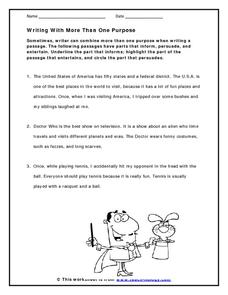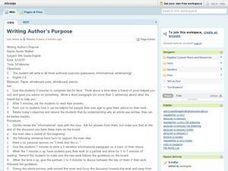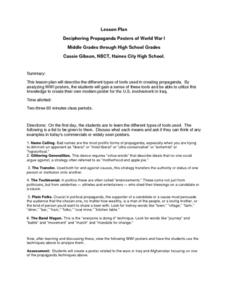Florida Center for Reading Research
Comprehension: Text Analysis, Persuade, Inform, and Entertain Sort
Why do authors write? Practice determining the author's purpose with a categorizing activity. Learners sort twelve short passages into three categories: persuade, inform, and entertain.
Curated OER
Author's Purpose
A simple activity for young readers, this introduces the idea of author purpose. Learners analyze various types of texts (newspaper articles, magazines, books, advertisements, etc.) and determine if the author's purpose for writing was...
Curated OER
Using Details from Text to Identify Author's Purpose
Explore writing techniques by analyzing newspapers and magazines with middle schoolers. They will collaborate in small groups to read local news stories and identify the main ideas and author's intent. They also utilize an information...
Student Handouts
Why Does an Author Write?
To get to the heart of a writer's purpose, just remember to have some PIE (Persuade, Inform, or Entertain)! And appropriately, here is a PIE chart that leaves room for pupils to identify each letter of the acronym and any other ideas or...
Teach-nology
Writing with More Than One Purpose
It's not very hard to find the author's purpose in narrative, informative, or persuasive writing, but what happens when an author's purpose includes all three types of writing? Determine which sentences in three paragraphs are meant to...
Curated OER
Writing Author's Purpose
Write in all three authorial purposes (persuasive, informational, entertaining) with this lesson plan. Young writers consider a time when a friend of theirs helped them out and gave them advice on something. They write a short paragraph...
Curated OER
Preparing for the Informative Speech
Students read an outline on how to prepare an informative speech. In this informative speech lesson plan, students read an outline and then prepare a speech.
Curated OER
Reading-Author's Purpose
Students review what author's purpose is by understanding that authors either persuade, inform, describe, or entertain with their story. In this language arts lesson, students bring in junk mail and in small groups discuss what the each...
Teach-nology
Author's Purpose
Challenge your class to find the three purposes for writing. After they read three short passages, kids note whether the author's purpose was to inform, persuade, or entertain.
Crabtree Publishing
Why Does Media Literacy Matter?
Criticism of news and entertainment journalism is at an all-time high. Help 21st-century learners develop the media literacy skills they need to become critical consumers with a three-lesson guide the looks at persuasive techniques used...
Curated OER
Turning Literature into News
Learners examine the newspaper. In this writing purposes lesson, students read the newspaper and discuss the purpose: to inform, entertain and persuade. Learners identify facts and opinions. Students write an article and discuss acts of...
Teach-nology
Author’s Purpose
What is the author's purpose in writing a joke book? What about a book about the digestive system? Explore author's purpose with a worksheet that challenges kids to identify whether ten books are meant to entertain, inform, or persuade.
Curated OER
Author's Purpose
Find the author's purpose in this review worksheet. Fourth graders read each of the three following paragraphs and decide whether the author's purpose is to persuade, inform, or entertain. You could use this activity as a class...
Curated OER
Categorizing Texts According To Author's Purpose
Young scholars categorize books into the 3 different kinds of author's purpose. In this author's purpose lesson plan, students categorize them into the categories of entertain, inform, and persuade.
Curated OER
Lesson 1: Identifying an Author's Purpose
Different types of text are written for very different reasons. Learners discuss the differences in writing to entertain, to inform, and to persuade their audiences. They work on identifying the author's purpose by reading and charting...
Teach-nology
The Purpose of Summaries
How can you tell the author's purpose from just a short summary? Kids read three different summaries of books to determine whether the author meant to entertain, persuade, or inform.
Curated OER
The Breakfast Busters Persuade Others
Students write persuasive essays about their favorite breakfast cereal after seeing how advertisements are used to influence people.
Curated OER
Deciphering Propaganda Posters of World War I
What strategies are employed when creating propaganda? Your young historians will learn about six different techniques utilized in the construction of political propaganda, particularly in the advertisements of World War I. The...
Curated OER
Author's Purpose
Read each of the three short passages and decide whether the author's purpose is to persuade, inform, and entertain. After they have identified the purpose, fourth graders explain why they believe that each passage fits that purpose. You...
Curated OER
Product Persuasion
Students examine various products and analyze the marketing strategies used to entice consumers. They bring in a product they like to use, and using persuasive writing, they write their own advertisements for their products.
Curated OER
Using Logos and Mission Statements to Communicate Sustainable Forestry Information
Young scholars survey forestry foundations to see how they represent important information into their logos and mission statements. In this forestry lesson plan, students use the information to better understand visual representations...
Curated OER
Identify and Discuss the Author's Purpose
Examine author's purpose in a persuasive text using this scaffolded plan. You essentially have a verbatim script here, but it can definitely be used as an outline instead. Review questions that readers should ask themselves when...
Curated OER
How To Be Persuasive in an Entertainment Review
Students write persuasively through description and word choice while reviewing a topic of interest to them.
Curated OER
SAVE OUR EARTH
Students research current environmental problems in order to develop and deliver an oral presentation. The presentation persuades the audience to act on the student's point of view on the issue.

























